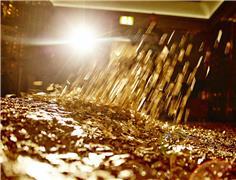- Write by:
-
Saturday, September 16, 2023 - 22:45:15
-
198 Visit
-
Print

Mining News Pro - A former JPMorgan Chase & Co. gold trader was ordered to serve six months behind bars for a fraud conviction tied to deceptive orders, the last criminal penalty imposed in a years-long spoofing saga at the bank.
Christopher Jordan was sentenced Friday in Chicago by US District Judge Edmond Chang. Jordan was convicted in December for placing deceptive spoofing orders from 2008 to 2010 that witnesses testified were rampant among traders on JPMorgan’s precious-metals desk.
The sentence comes weeks after JPMorgan’s former top gold trader, Gregg Smith, was given a two-year prison term — the stiffest sentence in the US government’s crackdown on questionable trading practices. The desk’s former “boss,” Michael Nowak, got a year behind bars, while two others who pleaded guilty in the case and cooperated with authorities avoided prison.
The JPMorgan cases were the crown jewels of the federal spoofing crackdowns on some major Wall Street banks, including Bank of America Corp., Deutsche Bank AG and Morgan Stanley. JPMorgan agreed in 2020 to pay $920 million to settle allegations brought by the Justice Department. It was the biggest fine by any financial institution accused of market manipulation since the Global Financial Crisis.
Spoofing has long been known throughout in commodity trading, but it became illegal after the Dodd Frank Act was adopted in 2010. The practice involves placing large buy or sell orders that a trader has no intention of executing that are quickly canceled, but not before they create the false impression of market demand that can move prices.
‘Price manipulation’
The defense, as part of their case against prison time, argued that Jordan’s actions took place prior to the Dodd-Frank financial law that defined spoofing and made it illegal. The judge rejected this argument.
“There was no need to spell out exactly what spoofing was because price manipulation was barred, and that’s what this is,” the judge said. “This was a very serious offense. You did put out lies into the market in the form of those spoof orders, and the government is correct that market integrity is a paramount value to our economy.”
Jordan worked on the JPMorgan precious-metals desk for about three years and then spent a few months in 2010 working for Credit Suisse AG. It was during 2008, 2009 and 2010 that prosecutors alleged Jordan was placing orders to buy and sell precious metals without the intent to execute the trades.
At the center of the case was a meeting between Jordan and an FBI agent in 2018, during which prosecutors argued that Jordan admitted to fraudulent trading. Defense attorneys for Jordan said their client never admitted specifically to spoofing or fraud or any other kind of illegal activity — claims that the FBI agent, Jonathan Luca, confirmed during his testimony on the witness stand.
The government said Smith was the most prolific spoofer on JPMorgan’s powerful global trading desk, which bought and sold gold and silver. Smith clicked his computer mouse so fast to place and cancel orders that colleagues joked he needed to ice his fingers to cool them down, according to testimony at his trial.
Federal jurors in Chicago convicted Smith and Nowak last year after concluding the two had used deceptive trade orders to move precious-metals prices up and down for profit from 2008 to 2016. In earlier trials, two former precious-metals traders at Deutsche Bank and two from Bank of America also were convicted of spoofing. All four got one-year sentences.
During Jordan’s trial in December, his lawyers argued he’d traded “according to the rules as he understood them,” telling jurors to be careful not to apply current standards to his trading from 2008 to 2010.
Short Link:
https://www.miningnews.ir/En/News/627382

China’s Zhaojin Mining Industry said on Wednesday that its A$733 million ($477.8 million) offer to buy Australia’s ...

Toronto-listed miner OceanaGold Corp said on Wednesday it will raise 6.08 billion pesos ($106 million) through an ...

Gold’s record-setting rally this year has puzzled market watchers as bullion has roared higher despite headwinds that ...

AbraSilver Resource said on Monday it has received investments from both Kinross Gold and Central Puerto, Argentina’s ...

Gold took a tumble as haven demand waned after geopolitical tensions eased in the Middle East.

The four largest indigenous communities in Chile’s Atacama salt flat suspended dialogue with state-run copper giant ...

A prefeasibility study for Predictive Discovery’s (ASX: PDI) Bankan gold project in Guinea gives it a net present value ...

Representatives from the Peñas Negras Indigenous community, in northwestern Argentina, clashed with heavily armed police ...

Newmont confirmed on Wednesday that two members of its workforce died this week at the Cerro Negro mine located in the ...
No comments have been posted yet ...